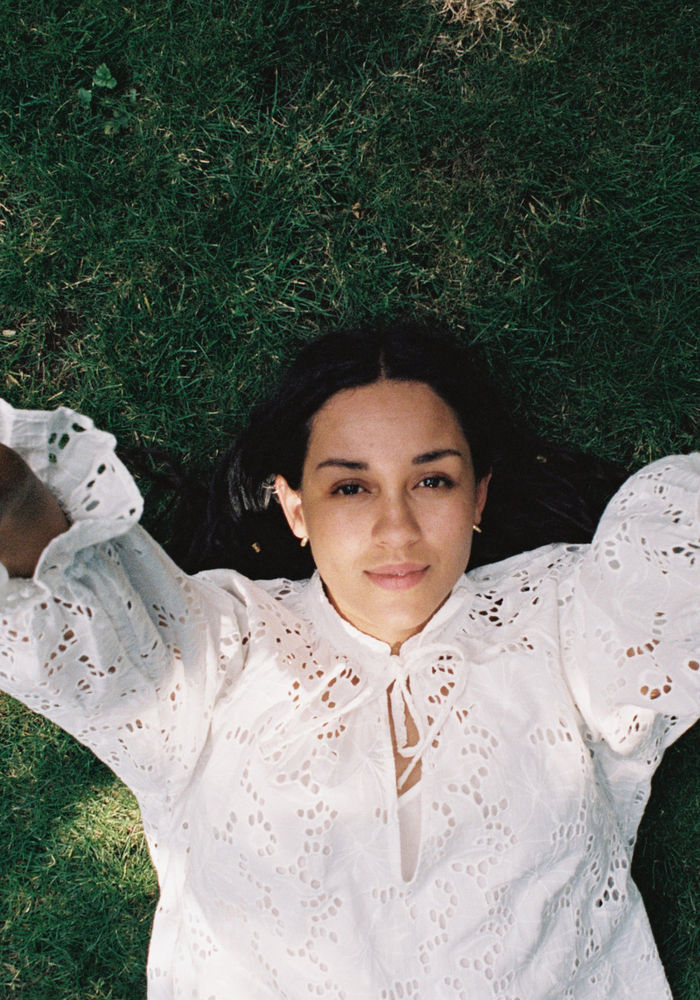There’s a moment in Waiting Game, the centrepiece of Eliza Shaddad’s new album The Woman You Want, when the various strands of her artistic evolution over the past three years are audibly woven together. Just as the familiar shimmer of chorus-dipped and reverb-drenched electric guitar intertwines with Shaddad’s delicate vocal, waves of synths and frenetic electronic beats splinter what has come before and reveal a sound unlike anything that has graced her already eclectic output; the post-grunge influences of previous records dashed and replaced with something more akin to Bjork in her mid-nineties pomp.
But Waiting Game isn’t the only example of Shaddad as an artist in creative transition. Since the release of her 2018 debut Future, she has released a clutch of singles and EPs that have hinted heavily at a move away from the early ‘90s musical blueprint upon which her inaugural outing was founded. On 2020’s Sept ~ Dec EP, the track One Last Embrace saw Shaddad at her heaviest yet, while recent single Blossom is positively pastoral. Indeed, there are plenty of moments on The Woman You Want that see her flexing her sonic extremities.
“There were a couple of things on Sept ~ Dec that were ready for this album but didn't quite make it,” Shaddad says, explaining the themes and sonic qualities that anchor each song to their respective releases. “Future was about one situation and all the ramifications and perspectives that I had or imagined around that situation. And a couple of the songs on Sept ~ Dec didn't fit conceptually or musically. After that EP came out, I felt like I wanted to push these different aspects that hadn't found a way onto the album.
“I started out in traditional folk, natural sounding instruments and as I grew up I wanted to delve more into grunge,” she continues. “I fought hard to get from this folk singer-songwriter space into this alternative indie space. Future was my statement and I fought to stick to that vision. I’m happy I made that statement, but now I feel like I can do whatever the hell I want!”
In contrast to the boundless artistic spirit that shaped the album, the recording process was heavily encumbered by lockdown restrictions, drastically transforming the production process from Shaddad’s initial vision. Still, after revising her approach, she was able to make the record she originally set out to make.
“My hopes for this record were that I would take my live band into a big studio,” she says. “Previously, it's just been me, a producer, maybe an engineer, thrashing out from the demos that I come to the studio with. I thought it’d be an amazing direction for me and the music, to really get the feeling of us playing live into the records. So, I was disappointed not to be able to do that and I worried about how it was going to affect things. I wondered about the song choices and the things I was writing. But the more I wrote, I felt like it could be a slice of time kind of record; it will be a lo-fi, minimal production bedroom record to reflect the times we are in.
“But, as soon as we started recording with the track Heaven I felt really free to experiment. There was no pressure, no outside interference, I wasn't working with old management or label; I had free rein, and I was working with the person I pretty much trust most in the world [producer Ben Jackson]. As soon as we started adding instruments, I knew it wasn’t going to sound like a small bedroom record. There was no way that we were going to come out with nine lo-fi, miniature songs - there's a lot of power in there. And I feel really proud that we managed to achieve that in this exact room from which I'm speaking to you.”
So how did she achieve such a vast sonic scope for the record from the confines of her bedroom?
“I have to give a lot of credit to Mr. BJ Jackson, who produced the record and has done so much on things like drum sounds,” she says. “For most of the record, we programmed drums. There was a lot of hard work to get it to sound like we'd recorded it in a massive studio. Also, opting for more classical instruments that have more harmonics and more natural reverberating sounds, give that sense of weight and space.
“When we got to the end of the recording process, I knew that I wanted it to be mixed by someone other than ourselves. In the end, six of the songs were mixed by a guy called Sam Okell who works at Abbey Road. He does a lot of film scores and really big projects that need a lot of space and are very lush and hi-fi. His mixing was the final step in giving it the space it needed to breathe and the weight and impact I wanted it to have.”
Shaddad is now counting down the days until she takes The Woman You Want on tour in November. Like so many artists whose live plans have been on hold for almost a year and a half, the prospect of returning to the stage is one she cannot wait for.
“There has been an element of perspective; so many people have been so badly affected,” she states. “It's always hard as a musician or as an artist… it's a tricky balance between how important your art is to you and how important it is in the context of the universe and everyone else's lives. There's been a lot of, ‘you don't have it that bad’, ‘you can't complain’. But I've missed it and I really feel the weight of relief and excitement that it will happen again. November cannot come soon enough.”
You can listen to an extended version of this interview below.

